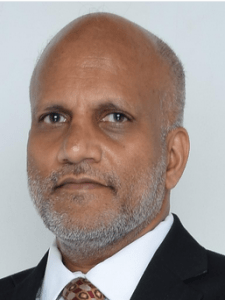Wednesday, March 2nd, 2022
8:30 – 10:00 a.m. EST / 7:00 – 8:30 p.m. IST
via Zoom
We were pleased to invite you to the sixth webinar in the 2021-2022 Envisioning India series, co-sponsored by the Sigur Center for Asian Studies and the Institute for International Economic Policy. This is a platform for dialogue and debate. We invite you to engage with us in this series of important discussions.
This event featured Professor Anirudh Krishna of Duke University to discuss “Understanding Poverty Dynamics and the Impact of the Pandemic.” Dr. Sekhar Bonu (NITI Aayog, India) and Christian Oldiges (UNDP) provided discussant remarks.
In this talk, Professor Anirudh Krishna discussed how income- and consumption-based measures are handy but provide an ephemeral and incomplete assessment of people’s underlying poverty status. Measures based on assets and capabilities more reliably reflect people’s structural situations, providing a better handle on sustained earning ability. He examined changes in longer-term poverty over the Covid-19 pandemic using the Stages-of-Progress method. He selected locations where he had collected household-level data several years earlier. On-the-ground surveys in one rural part undertaken in July and August 2021 show that while households’ incomes fell sharply, there was no accretion of longer-term poverty. In urban slums, however, structural poverty increased; assets and capabilities are considerably eroded. Mounting the appropriate response requires a fine-grained approach; because of differences in local economies, state and national averages are misleading.
The Envisioning India series is organized under the stewardship of IIEP Director Jay Shambaugh, Professor of International Affairs and Professor of Economics, and IIEP Distinguished Visiting Scholar Ajay Chhibber.
Abstract: Income- and consumption-based measures are handy but provide an ephemeral and incomplete assessment of people’s underlying poverty status. Measures based on assets and capabilities more reliably reflect people’s structural situations, providing a better handle on sustained earning ability. We examine changes in longer-term poverty over the Covid-19 pandemic using the Stages-of-Progress method. We select locations where we had collected household-level data several years earlier. On-the-ground surveys in one rural part undertaken in July and August 2021 show that while households’ incomes fell sharply, there was no accretion of longer-term poverty. In urban slums, however, structural poverty increased; assets and capabilities are considerably eroded. Mounting the appropriate response requires a fine-grained approach; because of differences in local economies, state and national averages are misleading.
About the Speaker
 Anirudh Krishna (PhD in Government, Cornell University, 2000; Master’s in Economics, Delhi University, 1980) is the Edgar T. Thompson Professor of Public Policy and Political Science at Duke University. His research of the past 25 years investigates how poor communities and individuals cope with the structural and personal constraints that result in poverty and powerlessness. Krishna has written more than seventy journal articles, and has eight books, including One Illness Away: Why People Become Poor and How they Escape Poverty and The Broken Ladder: The Paradox and the Potential of India’s One-Billion. For this body of work, Krishna was awarded an honorary doctorate by Uppsala University, Sweden, and received other academic awards. Before returning to academia, Krishna spent 14 years with the Indian Administrative Service, managing diverse rural and urban development initiatives. He has consulted with the World Bank, the United Nations, national governments, and non-government organizations.
Anirudh Krishna (PhD in Government, Cornell University, 2000; Master’s in Economics, Delhi University, 1980) is the Edgar T. Thompson Professor of Public Policy and Political Science at Duke University. His research of the past 25 years investigates how poor communities and individuals cope with the structural and personal constraints that result in poverty and powerlessness. Krishna has written more than seventy journal articles, and has eight books, including One Illness Away: Why People Become Poor and How they Escape Poverty and The Broken Ladder: The Paradox and the Potential of India’s One-Billion. For this body of work, Krishna was awarded an honorary doctorate by Uppsala University, Sweden, and received other academic awards. Before returning to academia, Krishna spent 14 years with the Indian Administrative Service, managing diverse rural and urban development initiatives. He has consulted with the World Bank, the United Nations, national governments, and non-government organizations.
About the Discussants
 Dr. Sekhar Bonu joined as the Director General of Development Monitoring and Evaluation Office (DMEO) in April 2019. The Government established DMEO in September 2015 as an attached office of the NITI Aayog to fulfil the monitoring and evaluation mandates assigned to NITI Aayog. Before joining NITI Aayog, Dr. Bonu worked with the Asian Development Bank (ADB) in Manila for 15 years. At ADB, he worked in health, urban infrastructure development and regional cooperation, mainly in South Asia. Dr. Bonu worked in the Indian Administrative Services and served as a civil servant in Rajasthan between 1987-2003, among others, as district magistrate, director of primary and secondary education, chief executive officer of state-owned Enterprises. Dr. Sekhar Bonu has a PhD from Johns Hopkins University and is a Chartered Financial Analyst charter holder. He has a wide range of research and operational interests and has published in peer-review journals.
Dr. Sekhar Bonu joined as the Director General of Development Monitoring and Evaluation Office (DMEO) in April 2019. The Government established DMEO in September 2015 as an attached office of the NITI Aayog to fulfil the monitoring and evaluation mandates assigned to NITI Aayog. Before joining NITI Aayog, Dr. Bonu worked with the Asian Development Bank (ADB) in Manila for 15 years. At ADB, he worked in health, urban infrastructure development and regional cooperation, mainly in South Asia. Dr. Bonu worked in the Indian Administrative Services and served as a civil servant in Rajasthan between 1987-2003, among others, as district magistrate, director of primary and secondary education, chief executive officer of state-owned Enterprises. Dr. Sekhar Bonu has a PhD from Johns Hopkins University and is a Chartered Financial Analyst charter holder. He has a wide range of research and operational interests and has published in peer-review journals.
 Christian Oldiges is a Development Economist, currently serving as Policy Specialist at the Inclusive Growth team of UNDP/BPPS, New York. He brings more than 10 years of experience in the fields of development economics, policy advocacy and social protection. Previously, as Director of Policy Research at the Oxford Poverty and Human Development Initiative (OPHI), University of Oxford, he has been directly involved in developing national MPIs with governments in South Asia and sub-Saharan Africa. In postdoctoral studies at Oxford, he has written about how 270 million people moved out of multidimensional poverty in India within a decade, poverty reduction and its interlinkages with COVID-19, migration, and conflict, as well as on workfare programs and food security in India. He holds a PhD in Economics (Heidelberg University, Germany) and has studied at Hindu College and the Delhi School of Economics, Delhi University.
Christian Oldiges is a Development Economist, currently serving as Policy Specialist at the Inclusive Growth team of UNDP/BPPS, New York. He brings more than 10 years of experience in the fields of development economics, policy advocacy and social protection. Previously, as Director of Policy Research at the Oxford Poverty and Human Development Initiative (OPHI), University of Oxford, he has been directly involved in developing national MPIs with governments in South Asia and sub-Saharan Africa. In postdoctoral studies at Oxford, he has written about how 270 million people moved out of multidimensional poverty in India within a decade, poverty reduction and its interlinkages with COVID-19, migration, and conflict, as well as on workfare programs and food security in India. He holds a PhD in Economics (Heidelberg University, Germany) and has studied at Hindu College and the Delhi School of Economics, Delhi University.
